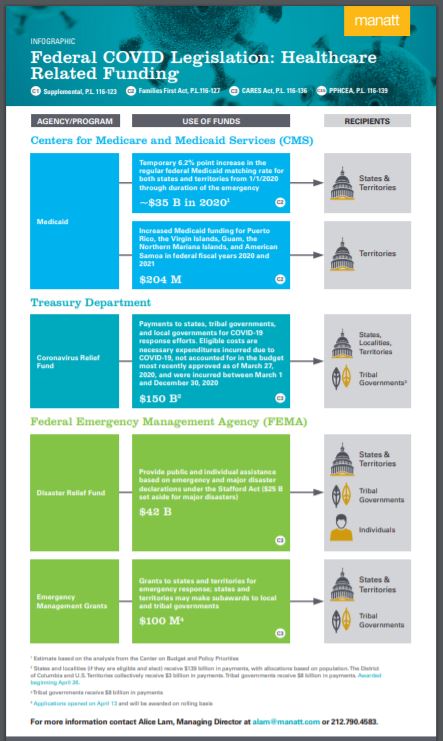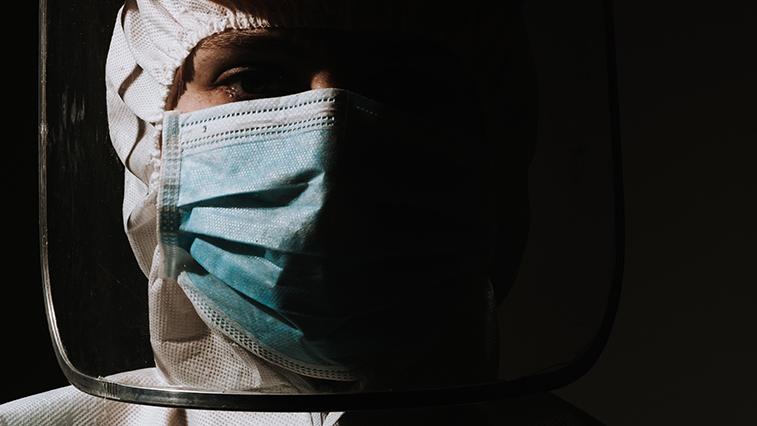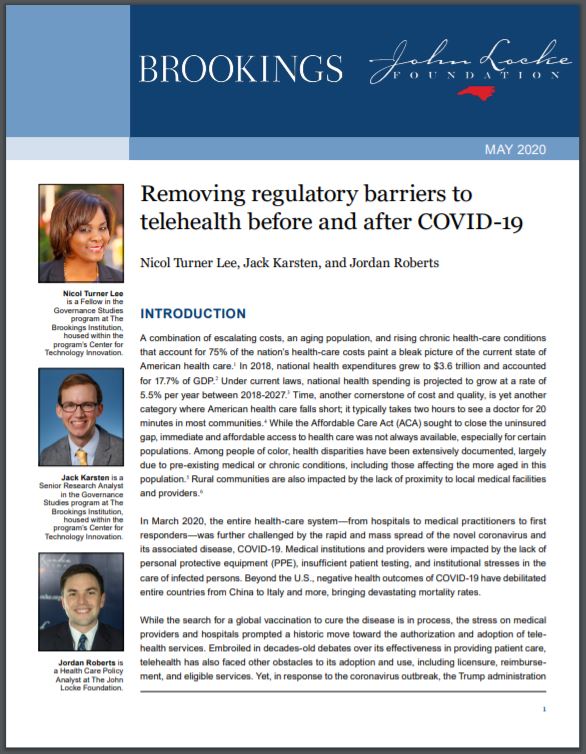Advancing Public Policies for people with Mental Illness, Substance Use Disorder and/or Intellectual/Developmental Disabilities
|
|
 |
|
First Autism Nature Trail in the United States Will Be in WNY
8 stations on a 1 mile trek nature trail.
The first autism trail in the United States (and the only other one that is even remotely like it is in Japan) will be right here in Western New York at Letchworth State Park hopefully breaking ground by the end of this year! Read more
here.
|
Manatt Health Infographic: Federal COVID-19 Legislation: Healthcare-Related Funding
Manatt Health has released a new infographic detailing federal funding across the four federal COVID-19 stimulus bills to date:

|
|
 |
|
Beyond PPE: Protecting Health Care Workers To Prevent A Behavioral Health Disaster

As the United States grapples with the increasing toll of the COVID-19 pandemic, the short- and long-term impacts on the health of front-line health care workers (HCWs) must be considered. Proposed
policies
to protect HCWs' health and safety have rightly focused on ensuring access to high-quality personal protective equipment (PPE) and meeting other occupational safety needs. Missing from the conversation is a comprehensive strategy to counter another threat facing front-line HCWs: the impact of sustained, acute psychological and moral trauma on behavioral
health
.
Recent
articles
have highlighted the
impact
of caring for COVID-19 patients on the physical
and psychological well-being of HCWs.
While recent legislation has broadly acknowledged the strain the COVID-19 pandemic has placed on the health care workforce and on the behavioral health care system, both the
CARES
Act and the
HEROES
legislation recently passed by the House are silent on the behavioral health care needs of HCWs caring for COVID-19 patients.
To fill this void, we propose a coordinated national strategy to identify, prevent, mitigate, and manage post-traumatic stress disorder (PTSD) symptoms in HCWs serving the nation during the pandemic
. Read more here.
|
|
 |
|
|
 |
|
UPCOMING EVENTS &
TRAININGS
Connecting to Care - How to Leverage Quitlines to Better Support Your Clients
June 8, 2 - 3 pm, National Council for Behavioral Health
Videoconferencing to Deliver Treatment and Recovery Services
June 9, 12 - 1 pm, ATTC Network
Improving Access to Care through Family Involvement & Engagement in Coordinated Specialty Care: Innovations & Best Practices
June 9, 2 - 3:30 pm, NASMHPD
June 10, 12 - 1:30 pm, Academy of Peer Services
Defining and Assessing Integrated Behavioral Health Capacity
June 10, 1 - 2 pm, ATTC Network
Implementing Best Practices and Improving Collaboration for Crisis Care and Suicide Prevention among High-Risk SMVF
June 10, 1:30 - 3 pm, SAMHSA's Service Members, Veterans, and Their Families Technical Assistance Center
June 10, 2 - 3:30 pm, SAMHSA
June 11, 12 - 1 pm, PsychU
Using PSYCKES for Clinicians
June 11, 2:30 - 4 pm, OMH
Using PSYCKES Quality Indicator Reports
June 17, 2 - 3 pm, OMH
June 17, 2 - 3 pm, National Council for Behavioral Health
June 18, 1 - 2 pm, National Council for Behavioral Health
June 22, 2 - 3:30 pm, SAMHSA
June 23, 1 - 2 pm, Manatt Health
Data Sharing Among Criminal Justice and Behavioral Health Partners-Addressing Data Sharing Agreements and Confidentiality Concerns
June 24, 2 - 3 pm, SAMHSA's GAINS Center
June 24, 3 - 4 pm, OMH
Supporting the Resilience of Black Men: Culturally Affirming and Responsive Approaches to Engagement, Treatment, and Recovery
June 25, 2 - 3 pm, SAMHSA BRSS TACS
Navigating System Cultures across the Sequential Intercept Model (SIM)
June 26, 2:30 - 4 pm, SAMHSA's GAINS Center
Improving Cultural Competence across the Sequential Intercept Model (SIM)
June 29, 2:30 - 4 pm, SAMHSA's GAINS Center
July 1, 1 - 2 pm, National Council for Behavioral Health
July 14, 1 - 2 pm, National Council for Behavioral Health
July 22, 2 - 3 pm, National Council for Behavioral Health
|
|
 |
|

|
JUNE 2020
Children & Families Committee Meeting
June 16: 11:30 am - 1 pm, GTM
DCS Mentoring Workshop: "Housing 101"
June 18: 9 am - 12 pm, GTM
JULY 2020
Developmental Disabilities Committee Meeting
July 9: 1 - 2:30 pm, GTM
Mental Hygiene Planning Committee Meeting
July 14: 1 - 3 pm, GTM
Children & Families Committee Meeting
July 21: 11:30 am - 1 pm, GTM
Contact CLMHD for all Call In and Go To Meeting information, 518.462.9422
|
|
|
In Hard-Hit Areas, COVID's Ripple Effects Strain Mental Health Care Systems

In late March, Marcell's girlfriend took him to the emergency room at Henry Ford Wyandotte Hospital, about 11 miles south of Detroit.
"I had [acute] paranoia and depression off the roof," said Marcell, 46, who asked to be identified only by his first name because he wanted to maintain confidentiality about some aspects of his illness.
Marcell's depression was so profound, he said, he didn't want to move and was considering suicide.
"Things were getting overwhelming and really rough. I wanted to end it," he said.
Marcell, diagnosed with schizoaffective disorder seven years ago, had been this route before but never during a pandemic. The Detroit area was a coronavirus hot spot, slamming hospitals, attracting concerns from federal public health officials and recording more than 1,000 deaths in Wayne County as of May 28. Michigan ranks fourth among states for deaths from COVID-19.
The crisis enveloping the hospitals had a ripple effect on mental health programs and facilities. The emergency room was trying to get non-COVID patients out as soon as possible because the risk of infection in the hospital was high, said Jaime White, director of clinical development and crisis services for Hegira Health, a nonprofit group offering mental health and substance abuse treatment programs. But the options were limited. Read more
here.
|
|
 |
|
|
Riding the Wave: Genesee County Mental Health Department Embraces Telehealth Services
Moved to the forefront by COVID-19, telehealth is the wave of the future for Genesee County Mental Health & Community Services, the agency's director said on Monday.
Speaking at the County Legislature's Human Services Committee Zoom videoconferencing meeting, Lynda Battaglia said her employees "love the fact that we can offer telehealth" as she presented a departmental review.
Legislators commended Battaglia, who was hired about eight months ago, for turning around a department that had been in disarray.
"Lynda came in at a very difficult time and has done a wonderful job," Gordon Dibble said. "I know I speak on behalf of the board (when I say) that she's done a great job under very difficult circumstances."
Battaglia acknowledged that the agency has faced some turmoil over the past year, but pointed out that the "level of service that has been provided to the clients never wavered. (That) really speaks to the quality of professionals that we have in the agency." Read more
here.
|
|
 |
|
|
Removing Regulatory Barriers to Telehealth Before and After COVID-19

This paper attempts to explore and extrapolate what state and federal policies will need to be adopted to potentially prepare for more ubiquitous adoption and use of telehealth services in an expanded set of use cases than those recorded by law. The authors also explore the application of existing and emerging state parity laws, which could serve as an obstacle to telehealth delivery in the future. Despite their application as a framework for reimbursement of COVID-19 expenses during the current application, the paper will provide guidance on these and other state and federal laws that will run counter to the long-term promotion and patient access of digital technologies, particularly those that aid in the management of primary care, chronic health conditions, and prevention. The paper concludes with a set of policy and pragmatic proposals that combine the recent lessons learned by the health-care community and patients, along with larger issues, including broadband access, that set the stage for future use. These recommendations were compiled after a structured focus group with medical practitioners, associations, and health policymakers working on the matters described in this paper.
Click here to read the full report.
|
|
 |
|
|
HMA Framework Examines Behavioral Health Crisis Diversion Facilities
HMA has provided a model framework examining an option for care for individuals with behavioral health needs who often find themselves involved with law enforcement or in hospital emergency rooms during times of crisis.
Mental illness and substance use disorders affect a large number of Americans, with emergency departments and law enforcement often serving as the most frequent respondents to individuals in crisis. Crisis Diversion Facilities can provide targeted, specialized mental health and substance use treatment that can stabilize people in crisis, reduce unnecessary and costly emergency room use and jail stays, and increase access to critical health and support services for vulnerable members of communities.
The model crisis diversion facility:
- Improves the health and well-being of individuals experiencing behavioral health crisis and those with repeated criminal justice system encounters by integrating supports and health care, law enforcement, criminal justice, and emergency agencies, to improve access to services that reduce reliance on emergency health and public safety responses;
- Is a coordinated community approach by stakeholders with key roles and responsibilities in the system of care that leverages multiple funding streams and community investment;
- Is developed in alignment with best practices and evidence-based models for driving a service delivery system that is trauma-informed, person-centered, and recovery-oriented.
The framework includes the following:
For any questions, please contact Bren Manaugh at
|
|
 |
|
Integrating Behavioral and Medical Health Services Still A Work in Progress
Although the time has come, we are still not there regarding integrating behavioral health services into physician medical practices. New research discovers optimal integration remains limited by cultural and financial barriers. However, providing technical support and improved payment models may enhance the long-term sustainability of the approach, according to the RAND Corporation study conducted in collaboration with the American Medical Association.
Researchers examined a diverse group of 30 physician practices that have pursued behavioral health integration. They found that by incorporating mental health services with medical care improved improve quality by expanding access to behavioral health services.
But even within the study's sample of practices that had successfully adopted behavioral health integration, financial sustainability was a pervasive concern, regardless of the payment models used by the practices. The findings are published online by the
Annals of Internal Medicine. Read more
here.
|
|
 |
|
|
Adapting Social Determinants of Health Screening for Remote Care

If you asked her in January, Ellie Zuehlke, director of Community Benefit and Engagement at Allina Health, would have said the health system would fully digitize its social determinants of health screening and referral in about five years. She couldn't have imagined that just a few months later the health system would have pivoted to digital in less than a week.
"In March, our world flipped upside down and we in Minnesota basically shut our clinic," Zuehlke said to PatientEngagementHIT. "People joke about it but it's really true. We implemented our five-year virtual strategy in five days."
At break-neck speed, Zuehlke and partners in the health technology and accountable communities departments revamped technology from NowPow. This tool allows providers to assess a digital
social determinants of health screener and provide virtual links to community-based services that can meet the needs detected in the screener. The technology also enables virtual connections between the highest-risk patients and healthcare navigators.
But before that, this was largely a paper-based system, Zuehlke described. Read more
here.
|
|
 |
|
|
For Opioid Users, Pandemic Means New Dangers, But Also New Treatment Options

Before Philadelphia shut down to slow the spread of the coronavirus, Ed had a routine: most mornings he would head to a nearby McDonald's to brush his teeth, wash his face and - when he had the money - buy a cup of coffee. He would bounce between homeless shelters and try to get a shower. But since businesses closed and many shelters stopped taking new admissions, Ed has been mostly shut off from that routine.
He's still living on the streets.
"I'll be honest, I don't really sleep too much," says Ed, who's 51 and struggling with addiction. "Every four or five days I get a couple hours." NPR agreed not to use his last name because he uses illegal drugs.
Philadelphia has the highest overdose rate of any big city in America -
in 2019, more than three people a day died of drug overdoses there, on average. Before the coronavirus began spreading across the United States, the opioid overdose epidemic was the biggest health crisis on the minds of many city officials and public health experts. But the coronavirus pandemic has largely eclipsed the conversation around the opioid crisis. It still rages on despite business closures, the cancellation of in-person treatment appointments and the strain on many addiction resources in the city. Read more
here.
|
|
 |
|
This year, what has been top of mind for many executives attending the Institute is how to adapt your strategy in the current crisis-and how to use innovation to succeed in an altered health and human service landscape.
But one question keeps coming up-where do "value" and "value-based" reimbursement fit in all of this? I think the looming budget deficits will make all payers focus more on the value of what they get for the money spent on beneficiaries. These deficits would also likely propel more use of managed care by Medicaid and Medicare-and more value-based reimbursement that includes more financial risk to provider organizations. My initial thinking about what likely lies ahead was confirmed by Charles Ingoglia, the chief executive officer for the National Council for Behavioral Health, in our panel discussion,
Navigating The New Normal With COVID-19 Part 2: An Update On Sustainable Strategies For The Disrupted Market.
How do executives demonstrate the value of their service lines and use their performance data to establish a competitive advantage? How do they leverage that data to get more and better contracts with health plans and other payers? Read more
here.
|
|
|